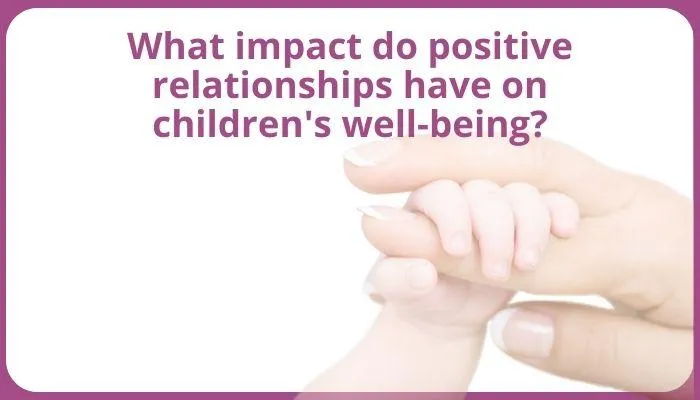Every child's well-being matters.
Well-being Articles

What impact do positive relationships have on children's well-being?
Custom HTML/CSS/JAVASCRIPTPositive relationships act as a beacon of light on a gloomy day, improving every aspect of life. Similar to how close friendships uplift our spirits, children also experience substantial benefits from cultivating positive connections with those around them—family, teachers, or friends.
Firstly, let's delve into the realm of emotions. Children who enjoy positive relationships with their parents or caregivers experience a sense of security and love. This nurturing environment helps them develop confidence and better understand their emotions, like having a comforting blanket enveloping them during moments of fear or sadness.
Social skills play a significant role as well. When children build positive relationships, they find it easier to make friends and integrate into groups. These connections teach them effective communication, sharing, and conflict resolution, providing a kind of social playbook for making friends and enjoying shared activities.
Supportive adults who encourage and assist children in overcoming challenges contribute to academic success. This encouragement is like being a cheering squad during a race, providing the necessary motivation to persist and give their best effort in school.
Positive relationships also play a vital role in boosting children's self-esteem. Affirming relationships makes children feel valued and unique. Acknowledgements such as praise for a job well done or a high-five for putting in effort work like magic, instilling self-belief and inspiring them to strive even harder.
Considering mental health, having trustworthy individuals to talk to reduces stress and worry for children. Strong relationships offer the fortitude to confront challenging situations and emerge resilient.
Moreover, relationships influence behaviour. Children observe and emulate positive behaviour when surrounded by kindness and respect. It's as though you are giving them a guidebook on how to treat others with kindness and be a good friend. Positive relationships contribute to shaping their understanding of ethical conduct.
Lastly, let's explore resilience. Children with a steadfast support system in both good and challenging times find it easier to rebound from setbacks. This supportive network acts like a safety net, reassuring and catching them when they stumble. Positive relationships instil the courage to persevere, regardless of the obstacles.

What impact do positive relationships have on children's well-being?
Custom HTML/CSS/JAVASCRIPTPositive relationships act as a beacon of light on a gloomy day, improving every aspect of life. Similar to how close friendships uplift our spirits, children also experience substantial benefits from cultivating positive connections with those around them—family, teachers, or friends.
Firstly, let's delve into the realm of emotions. Children who enjoy positive relationships with their parents or caregivers experience a sense of security and love. This nurturing environment helps them develop confidence and better understand their emotions, like having a comforting blanket enveloping them during moments of fear or sadness.
Social skills play a significant role as well. When children build positive relationships, they find it easier to make friends and integrate into groups. These connections teach them effective communication, sharing, and conflict resolution, providing a kind of social playbook for making friends and enjoying shared activities.
Supportive adults who encourage and assist children in overcoming challenges contribute to academic success. This encouragement is like being a cheering squad during a race, providing the necessary motivation to persist and give their best effort in school.
Positive relationships also play a vital role in boosting children's self-esteem. Affirming relationships makes children feel valued and unique. Acknowledgements such as praise for a job well done or a high-five for putting in effort work like magic, instilling self-belief and inspiring them to strive even harder.
Considering mental health, having trustworthy individuals to talk to reduces stress and worry for children. Strong relationships offer the fortitude to confront challenging situations and emerge resilient.
Moreover, relationships influence behaviour. Children observe and emulate positive behaviour when surrounded by kindness and respect. It's as though you are giving them a guidebook on how to treat others with kindness and be a good friend. Positive relationships contribute to shaping their understanding of ethical conduct.
Lastly, let's explore resilience. Children with a steadfast support system in both good and challenging times find it easier to rebound from setbacks. This supportive network acts like a safety net, reassuring and catching them when they stumble. Positive relationships instil the courage to persevere, regardless of the obstacles.

What impact do positive relationships have on children's well-being?
Custom HTML/CSS/JAVASCRIPTPositive relationships act as a beacon of light on a gloomy day, improving every aspect of life. Similar to how close friendships uplift our spirits, children also experience substantial benefits from cultivating positive connections with those around them—family, teachers, or friends.
Firstly, let's delve into the realm of emotions. Children who enjoy positive relationships with their parents or caregivers experience a sense of security and love. This nurturing environment helps them develop confidence and better understand their emotions, like having a comforting blanket enveloping them during moments of fear or sadness.
Social skills play a significant role as well. When children build positive relationships, they find it easier to make friends and integrate into groups. These connections teach them effective communication, sharing, and conflict resolution, providing a kind of social playbook for making friends and enjoying shared activities.
Supportive adults who encourage and assist children in overcoming challenges contribute to academic success. This encouragement is like being a cheering squad during a race, providing the necessary motivation to persist and give their best effort in school.
Positive relationships also play a vital role in boosting children's self-esteem. Affirming relationships makes children feel valued and unique. Acknowledgements such as praise for a job well done or a high-five for putting in effort work like magic, instilling self-belief and inspiring them to strive even harder.
Considering mental health, having trustworthy individuals to talk to reduces stress and worry for children. Strong relationships offer the fortitude to confront challenging situations and emerge resilient.
Moreover, relationships influence behaviour. Children observe and emulate positive behaviour when surrounded by kindness and respect. It's as though you are giving them a guidebook on how to treat others with kindness and be a good friend. Positive relationships contribute to shaping their understanding of ethical conduct.
Lastly, let's explore resilience. Children with a steadfast support system in both good and challenging times find it easier to rebound from setbacks. This supportive network acts like a safety net, reassuring and catching them when they stumble. Positive relationships instil the courage to persevere, regardless of the obstacles.

What impact do positive relationships have on children's well-being?
Custom HTML/CSS/JAVASCRIPTPositive relationships act as a beacon of light on a gloomy day, improving every aspect of life. Similar to how close friendships uplift our spirits, children also experience substantial benefits from cultivating positive connections with those around them—family, teachers, or friends.
Firstly, let's delve into the realm of emotions. Children who enjoy positive relationships with their parents or caregivers experience a sense of security and love. This nurturing environment helps them develop confidence and better understand their emotions, like having a comforting blanket enveloping them during moments of fear or sadness.
Social skills play a significant role as well. When children build positive relationships, they find it easier to make friends and integrate into groups. These connections teach them effective communication, sharing, and conflict resolution, providing a kind of social playbook for making friends and enjoying shared activities.
Supportive adults who encourage and assist children in overcoming challenges contribute to academic success. This encouragement is like being a cheering squad during a race, providing the necessary motivation to persist and give their best effort in school.
Positive relationships also play a vital role in boosting children's self-esteem. Affirming relationships makes children feel valued and unique. Acknowledgements such as praise for a job well done or a high-five for putting in effort work like magic, instilling self-belief and inspiring them to strive even harder.
Considering mental health, having trustworthy individuals to talk to reduces stress and worry for children. Strong relationships offer the fortitude to confront challenging situations and emerge resilient.
Moreover, relationships influence behaviour. Children observe and emulate positive behaviour when surrounded by kindness and respect. It's as though you are giving them a guidebook on how to treat others with kindness and be a good friend. Positive relationships contribute to shaping their understanding of ethical conduct.
Lastly, let's explore resilience. Children with a steadfast support system in both good and challenging times find it easier to rebound from setbacks. This supportive network acts like a safety net, reassuring and catching them when they stumble. Positive relationships instil the courage to persevere, regardless of the obstacles.
Quality Early Years Ltd.,
Dickens House,
Guithavon Street,
Witham, Essex,
England, CM8 1BJ
© Quality Early Years Ltd 2025

Find On the Button
on Social Media

